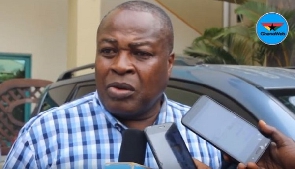Accra. May 22, GNA - The economy is responding favourably to the deepening in macroeconomic stability buoyed by increased credit to the private sector and a high pace of budgetary spending.
Dr Paul Acquah, Governor of Bank of Ghana(BOG) and Chairman of the Monetary Policy Committee, told a press conference that strong export growth, including non-traditional exports and higher inward transfers continued to be a source of resilience to the economy.
Besides, monetary developments and money market conditions continued to put a firm downward pressure on prices and cost expectations in line with establishing robust, low single-digit inflation.
Dr Acquah said these developments impacted positively on the Bank of Ghana's Composite Index of Economic Activity, which went up by 4.1 per cent in real terms compared to two per cent in the last quarter of 2005. Major components of the index, which include exports, imports, port activities, private sector contributions to the Social Security and National Insurance Trust (SSNIT) on behalf of their employees, industrial electricity consumption, credit to private sector, tourists' arrivals and cement sales recorded above trend increases during the quarter.
Similarly, credit to the private sector and public institutions by the deposit money banks expanded by 5.6 trillion cedis, an increase of 42.1 per cent in the 12 months to March 2006.
Dr Acquah said the private sector accounted for 64.2 per cent of the credit growth with the services sector taking a chunk of 34.4 per cent, manufacturing 23 per cent and agriculture 6.4 per cent among other sectors.
He said strong domestic demand resulted in rapid growth in imports in the first quarter of the year, with non-oil imports provisionally estimated at 1.1 billion dollars up from 948.8 million dollars for the same period last year.
Intermediate and capital goods accounted for 69.3 per cent of total non-oil imports while consumption goods accounted for 21.9 per cent. Dr Acquah said declining interest rates on the money market during the first four months of the year led to a shift in asset portfolios towards longer dated government debt instruments.
The benchmark 91-day Treasury Bill rate declined by 180 basic points to 9.60 per cent while the yields on the medium-term Government-instruments also dropped with the yield on the two-year fixed rate note declining from 20 per cent to 16 per cent.
Dr Acquah said total banking system assets amounted to 39.7 trillion cedis as at the end of March, showing an annual growth of 23.3 per cent compared to 25.7 per cent a year earlier.
On Government expenditure, he said, preliminary results indicated that Government expenditure had outpaced revenues, resulting in an increase in Government net domestic borrowing.
Provisional estimates put total Government receipts at 8.4 trillion cedis of which tax revenue amounted to 6.2 trillion cedis, some 2.7 per cent above the outturn for the same period in 2005.
However, tax collections on income and property by the Internal Revenue Service was 1.8 trillion cedis, falling short by 0.9 per cent relative to the collections for the same period in 2005.
Collections by the Customs, Excise and Preventive Service were also down at 3.4 trillion cedis, a nine per cent drop from the same period last year.
Dr Acquah said in contrast, Domestic VAT and Excise Duty collections were higher at 935.5 billion cedis, an increase of 7.7 per cent above the outturn for 2005 and a reverse of the decline in the first quarter of last year while non-tax revenue almost doubled at 934 billion cedis. He said total Government expenditure for January to April 2006 amounted to 8.3 trillion cedis, about 41 per cent above the outturn for the same period last year.
Dr Acquah attributed the increase to the new budget cycle for 2006, which saw the parliamentary approval of the Budget before the start of the year and its execution much earlier than in previous years.
Consequently, net domestic financing at the end of April stood at an estimated 2.4 trillion cedis, representing 2.2 per cent of GDP. On the external front, Dr Acquah said strong gains in gold prices were eroded by sharp increases in oil prices.
The price of gold reached 656 dollars per ounce at the end of April from 522 dollars at the beginning of the year, a rise of 25.6 per cent during the year and 52.5 per cent over its level a year ago. Cocoa prices, however, declined to 891 pounds per ton at the end of April down from 916 pounds a ton at the beginning of the year.
Dr Acquah said crude oil prices remained high and volatile due to geopolitical risks and concern about growing demand and capacity constraints with the price of Brent Crude rising to a record of 73.21 dollars per barrel at the end of April 2006.
Total export earnings were provisionally estimated at 959 million dollars, an increase of 31.2 per cent above the 730.8 million dollars recorded for the same period last year.
Total Private Inward Remittances amounted to 1.46 billion dollars, a 51.2 per cent increase over the corresponding period in 2005, of which 425 million dollars represented remittances from individuals. On the foreign exchange market, the Governor said the cedi continued to show stability depreciating by 0.2 per cent against the dollar while it lost grounds against the euro and pound sterling. Dr Acquah said gross international reserve now stood at 1.91 billion dollars and translated into 3.8 months of import cover.
In line with these developments, the Monetary Policy Committee has decided to keep the Bank of Ghana Prime Rate unchanged at 14.5 per cent.
Click to view details



Business News of Monday, 22 May 2006
Source: GNA
















